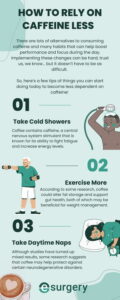
In the Western world, caffeine consumption has become part of our culture, with coffee shops on what feels like every street corner in every town and city in the UK. But how much caffeine is too much? We’re looking into what caffeine actually is and where it comes from, how humans have utilised its power and what the risks are to your body with consuming too much of it. We know… you’ve probably been avoiding having to confront how many times you might be sneaking off to make a coffee during the day, or gulping on an energy drink, but here at e-Surgery, your health and well-being come first and is always our top priority!
Take one last sip, and we’ll begin.
Side Effects of Caffeine
There are numerous negative effects that may result from excessive caffeine consumption, and they usually occur when you consume high levels of caffeine in one go or continuous consumption over time.
Some of the negative side effects include:
- Insomnia
- Anxiety
- Jitteriness
- Nausea
- Headaches
- Irritability
- Exhaustion
Obviously, there are some positive effects of caffeine, otherwise, nobody would consume it! So, here are some of the benefits people can experience:
- Increased alertness
- More energetic
- Increased concentration

How Much Caffeine is Too Much?
The European Food Safety Authority state that the maximum daily intake of caffeine should not exceed 400 milligrams. It’s important to note that this is only a roughly estimated amount as it is not known at which point someone is negatively affected by caffeine, as it is fully dependent on the individual.
It’s important to remember that everyone is different, and our bodies respond to chemicals in different ways. One person may be able to drink 4 cups of coffee and feel only slightly affected, compared to another person who may start feeling negative side effects after just one cup. Everyone’s tolerance level is different!
It is important that children and teenagers are not consuming high levels of caffeine during their developmental years, as the long-term effects on their cognitive development are not truly known.
The UK government has confirmed that it will ban the sale of energy drinks to under 16’s, but it is not currently known when this will happen. It follows after all of the UK’s leading supermarkets banned the sale to under 16’s back in 2018, in an attempt to help improve their concentration in schools.

How to Rely on Caffeine Less
There are lots of alternatives to consuming caffeine and many habits that can help boost performance and focus during the day. Implementing these changes can be hard, trust us, we know… but it doesn’t have to be as difficult. So, here’s a few tips of things you can start doing today to become less dependent on caffeine!
Take Cold Showers
Starting your day off with cold exposure or a cold shower has many health benefits for your body, including boosting your energy levels. Cold exposure releases epinephrine, which is more commonly known as adrenaline, and norepinephrine.
Exercise More
Often, we feel tired when we haven’t done much all day, or been sat down, whereas if you were to exercise regularly your energy levels will increase as a result. One study found that high-intensity interval training (HIIT) helps improve attention and short-term memory tasks.
Take Daytime Naps
Napping during the day has been shown to improve people’s cognitive function and concentration. So having an afternoon power nap might just be the key to keeping you performing at the same level as when you’re consuming caffeine.
Symptoms of Caffeine Withdrawal
Being a caffeine addict can lead to some disconcerting caffeine withdrawal symptoms. Although the symptoms are not as gruelling as those experienced by users of stronger, more serious drugs, they can still make an individual’s life uncomfortable for a length of time. Symptoms can include fatigue, difficulty concentrating, a caffeine headache, nausea, muscle pain, and irritability.
Just like with most drugs, the more dependent you are on the substance and the higher volume of it you consume, the higher the likeliness that the withdrawal symptoms will be more taxing. This theory tends to apply to caffeine addiction too but that is not to say that there are no exceptions.
During experimental studies, it has been found that about 50% of individuals experienced a caffeine headache and 13% had clinically significant distress and functional impairment. A severe caffeine headache experienced by those in the experiments left them unable to work.
People can often experience situational anxiety or a heightened state of anxiety when they drink too much caffeine.
As mentioned before, the more caffeine consumed, the more severe the caffeine withdrawal symptoms. However, it has been said that as little as one cup of coffee a day can cause caffeine addiction and halting consumption for a caffeine addict of this nature can still result in noticeable caffeine withdrawal.
Vitamins and Supplements That Ease Caffeine Withdrawal Symptoms
While there isn’t a lot of scientific evidence that vitamins and supplements are helpful with caffeine withdrawal, here are some vitamins and supplements that individuals have reported as being helpful:
- Vitamin C and B
- Calcium
- Magnesium
- Potassium
- Zinc
- Amino acids (tyrosine and phenylalanine)
There is also a group of herbal remedies that contain a range of vitamins and supplements that will aid you in giving up your caffeine addiction and help you with those not-so-nice caffeine withdrawal symptoms.
Another word used to describe this category of vitamins and supplements is adaptogens. Adaptogens will help to reduce the stress your body will experience when going through caffeine withdrawal. They also work to boost your energy levels without overstimulating.
Some adaptogens to consider are:
- Ginseng
- Ginger
- Ashwagandha
- Bacopa Monnieri
- Rhodiola Rosea
Unfortunately, much like with the other vitamins and supplements there has yet to be any scientific evidence that proves using vitamins and supplements will help a caffeine addict with their caffeine addiction and caffeine withdrawal symptoms. However, substituting caffeine with these vitamins and supplements is said to be helpful anecdotally by some individuals.
The History of Caffeine
Early humans first learned about the energising properties of several plants in antiquity. According to historical evidence, indigenous populations in Africa and South America were among the first to ingest caffeinated beverages. As early as the ninth century, coffee trees were being grown in East Africa. Coffee had reached the Arabian Peninsula by the fifteenth century, where coffee shops developed into centres of intellectual discourse. And debate!
People drinking tea dates back more than 4,000 years in East Asia, as it was seen as a calming and revitalising beverage by the Chinese, Japanese, and Korean cultures. In the 16th and 17th centuries, European explorers encountered coffee and tea while visiting these areas, and the drinks quickly spread around the world which is why caffeine is so easily accessible in the West today.

Natural Sources of Caffeine
Caffeine is found naturally in many fruits, beans and plants all over the world. So, let’s take a look at some of the most common sources of naturally occurring caffeine:
Coffee
Possibly the most popular source of caffeine worldwide is coffee. It is a natural stimulant that is derived from the coffee bean and has been eaten for millennia to improve alertness and cognitive performance. Coffee has become normalised in the corporate world and has most likely become too dependent on it to function in the workplace. Huge coffee chains are in every town you visit, with local independent coffee shops and roasteries opening each year. Coffee is often viewed as a more natural way of consuming caffeine when compared to drinking synthetic caffeine drinks.
Cocoa
Now you might not have known this one, but the main component of chocolate, cocoa, also contains caffeine. Even though cocoa doesn’t have as much caffeine as coffee or tea, it still gives the enjoyable sensation of enjoying chocolate a slight boost.
The fruits of the cacao tree are the source of cocoa beans, which are processed into cocoa butter or powder and utilised in a variety of your favourite foods. Cocoa also includes theobromine, another stimulant that works in conjunction with caffeine to enhance alertness and mood. Cocoa gives a lovely method to enjoy a little upliftment, fusing pleasure with a mild energy boost, despite not being a major source of caffeine.
Fruits & Plants
Caffeine can also be found in many plants and fruits, including Yerba Mate, which is a plant native to South America. The plant contains high levels of caffeine and has many anti-inflammatory effects on the body. Guarana berries have one of the highest concentrations of caffeine in any fruit, with around 3.6% to 5.8% caffeine by weight. There are many natural sources of caffeine, but they are often harder to find in your local shop or supermarket, so it’ll take a bit of digging to find out how to get your hands on them!
Synthetic Sources of Caffeine
Due to the huge amounts of caffeine that would need to be extracted from natural sources of caffeine, scientists found a method of creating synthetic caffeine, which helps meet the demand of the stock needed. Both types of caffeine are nearly identical in how they affect the body.
Let’s take a look at some of the modern products that have high levels of caffeine:
Energy Drinks
The modern-day demands of life have meant that people are depending on caffeine more than ever before. This resulted in major companies creating products that are branded with caffeine being the primary ingredient.
The energy drink industry is expected to be worth $83.83 billion by 2027, which is not surprising considering how popular these brands have become, especially in their involvement with major sports. The high levels of caffeine in these drinks allow for spikes in energy levels shortly after drinking them, which is an effective way of becoming more alert and aware when you’re feeling tired or still half asleep.
Pre-Workouts
The fitness industry has taken energy drinks one step further… bodybuilding, weightlifting and powerlifting communities have always been on the hunt for the next energy-enhancing trick, which is how pre-workout was born. It most commonly comes as a flavoured powder which can be dissolved into water. The levels of caffeine are usually at the maximum level they can be without making the product extremely dangerous and taste very bad. Pre-workout can also come in the form of a gel that is squeezed and directly swallowed.
We hope after reading this article you’re now an expert on all things caffeine! And you know the answer to how much caffeine is too much, so don’t threaten the next time you have that morning coffee, you don’t have to cut caffeine completely out of your life, but everything’s best in moderation.
If you are concerned with your health, then make sure to use e-Surgery’s free-to-use ‘Ask a Pharmacist’ service, which puts you in direct conversation with a medical professional.









